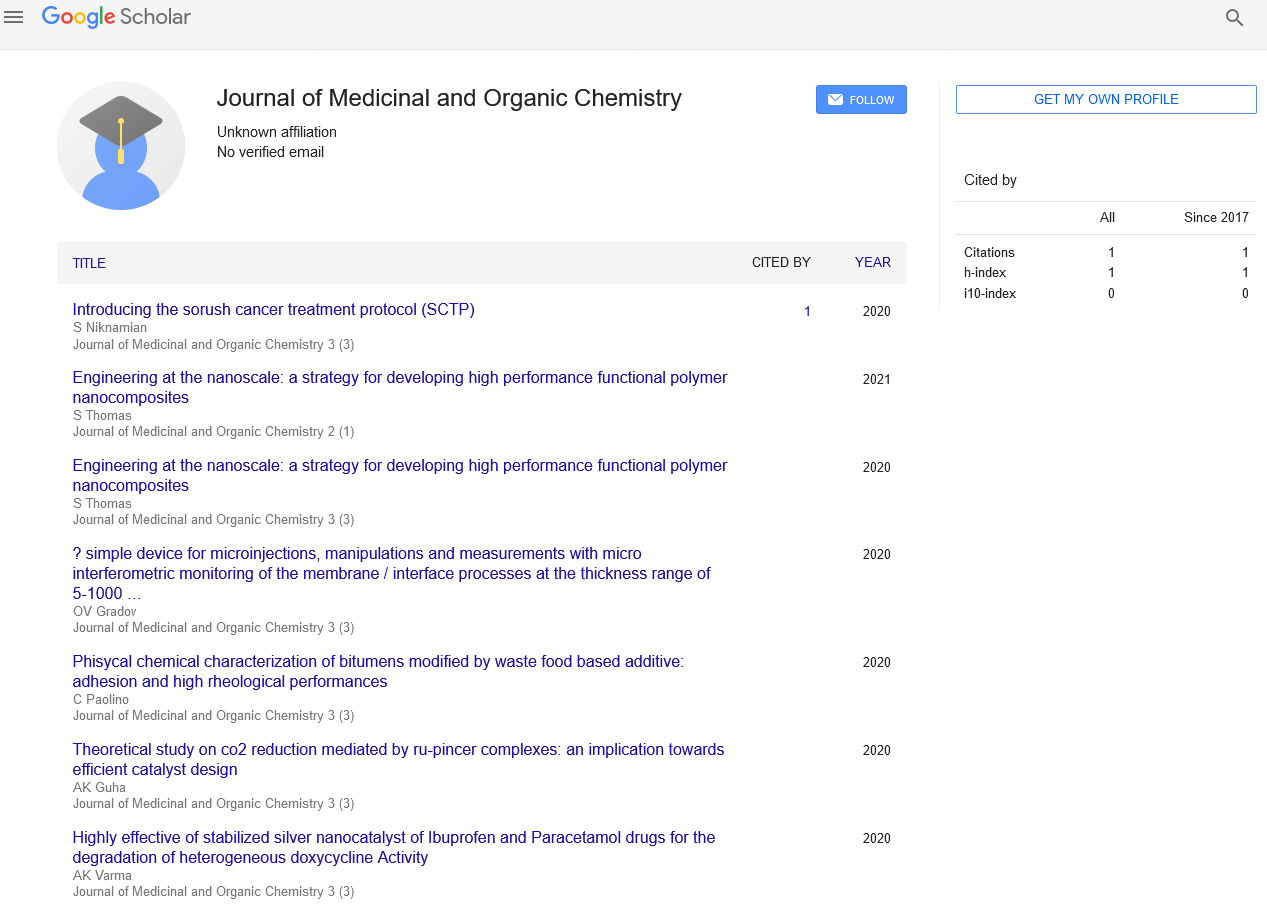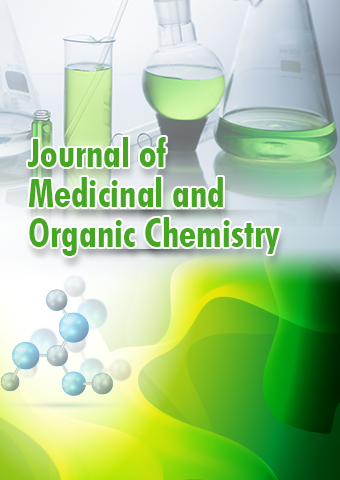Perspective - Journal of Medicinal and Organic Chemistry (2024) Volume 7, Issue 2
Unveiling the Mysteries of Organic Chemistry: Exploring the Carbon-Based World
- Corresponding Author:
- Hisani Ishida
Department of Organic Chemistry,
University of Tianjin,
Tianjin,
China
E-mail: hiishaniishida1218@okayama-u.ac.jp
Received: 07-Mar-2024, Manuscript No. jmoc-24-129078; Editor assigned: 12-Mar-2024, PreQC No. jmoc-24-129078 (PQ); Reviewed: 26-Mar-2024, QC No. jmoc-24-129078; Revised: 11-Apr-2024, Manuscript No. jmoc-24-129078 (R); Published: 18-Apr-2024, DOI: 10.37532/jmoc.2024.7(2).193-194
Introduction
Organic chemistry, often regarded as the language of life, is a branch of chemistry that focuses on the study of carbon-containing compounds-the building blocks of life itself. From the complexity of biological molecules to the intricacies of synthetic materials, organic chemistry permeates every facet of our world, offering insights into the structure, properties, and reactivity of organic compounds. In this comprehensive exploration of organic chemistry, we delve into its foundational principles, its diverse applications, and its profound impact on scientific discovery and technological innovation.
Description
The essence of organic chemistry: Carbon as the foundation
At the heart of organic chemistry lies the element carbon, which exhibits unparalleled versatility in forming bonds with other elements and molecules. Carbon’s ability to form stable covalent bonds with itself and a variety of other elements gives rise to the vast diversity of organic compounds found in nature and synthesized in the laboratory.
Organic compounds can range from simple hydrocarbons composed solely of carbon and hydrogen atoms to complex biomolecules such as proteins, carbohydrates, lipids, and nucleic acids, which form the basis of life. Understanding the structure, properties, and reactions of organic compounds is essential for unraveling the mysteries of biology, medicine, materials science, and beyond.
Key concepts in organic chemistry: Bonding, functional groups, and stereochemistry
Organic chemistry encompasses a rich array of concepts and principles that govern the behavior of organic compounds. Central to organic chemistry is the concept of covalent bonding, in which carbon atoms share pairs of electrons to form stable molecular structures. The nature of the bonds-single, double, or triple-determines the geometry and reactivity of organic molecules.
Functional groups, specific arrangements of atoms within a molecule, impart unique chemical properties and reactivity to organic compounds. Common functional groups include hydroxyl (-OH), carbonyl (C=O), amino (-NH2), and carboxyl (-COOH) groups, each contributing to the diverse array of organic molecules found in nature and synthesized for various applications.
Stereochemistry, the study of the spatial arrangement of atoms within molecules, plays a crucial role in organic chemistry, influencing the properties and biological activity of organic compounds. Isomers, molecules with the same molecular formula but different spatial arrangements, exhibit distinct chemical and biological properties, highlighting the importance of stereochemical considerations in drug design, catalysis, and materials science.
Applications of organic chemistry: From pharmaceuticals to materials science
Organic chemistry finds applications in a myriad of fields, ranging from pharmaceuticals and agrochemicals to materials science, energy, and environmental technologies. The synthesis and design of organic molecules play a central role in drug discovery and development, enabling the creation of novel therapeutics to treat diseases and improve human health.
Organic chemistry also underpins the development of advanced materials with tailored properties for specific applications. Polymers, for example, are large organic molecules composed of repeating units, offering versatility in materials design for industries such as plastics, textiles, electronics, and biomedical engineering. By tuning the chemical structure and properties of polymers, researchers can create materials with desired mechanical, thermal, and electrical characteristics, opening new avenues for technological innovation.
Challenges and frontiers in organic chemistry: Catalysis, green chemistry, and beyond
Despite its transformative impact on science and technology, organic chemistry faces challenges in addressing pressing societal needs and advancing sustainable practices. Catalysis, the acceleration of chemical reactions by catalysts, plays a pivotal role in organic synthesis, enabling more efficient and selective transformations with reduced waste and environmental impact.
Green chemistry, a burgeoning field within organic chemistry, seeks to develop sustainable chemical processes and materials that minimize waste generation, conserve energy and resources, and promote environmental stewardship. By employing principles such as atom economy, solvent-free reactions, and renewable feedstocks, green chemistry aims to transform the way chemicals are synthesized, produced, and used, paving the way towards a more sustainable and environmentally friendly future.
Moreover, organic chemistry continues to explore new frontiers in areas such as bioorganic chemistry, organometallic chemistry, and supramolecular chemistry, pushing the boundaries of molecular design and synthesis. From the development of new drug delivery systems to the creation of functional materials for energy storage and conversion, organic chemistry remains at the forefront of scientific discovery and technological innovation.
Conclusion
Organic chemistry stands as a testament to the boundless creativity and ingenuity of human inquiry, unlocking the mysteries of the carbonbased world and harnessing its potential for scientific advancement and societal benefit. From the intricate structure of biomolecules to the synthetic wonders of modern materials science, organic chemistry permeates every aspect of our lives, offering endless possibilities for exploration, discovery, and innovation.
As we navigate the complexities of the 21st century, let us embrace the transformative power of organic chemistry to address global challenges, advance sustainable practices, and improve the quality of life for future generations. With curiosity as our guide and creativity as our compass, the journey through the realms of organic chemistry promises to be an adventure filled with discovery, inspiration, and endless fascination.

